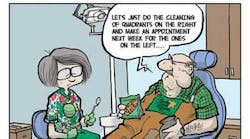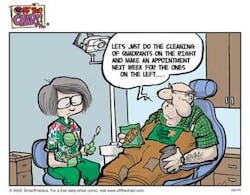Dear RDH:
I read with great interest the article, “Treating Oral Ulcers,” by Kathryn Gilliam, RDH, in December’s issue of RDH.
I have to tell you about my dental hygiene career before you read anything that is in my letter. I graduated from Erie County Technical Institute (now Erie Community College) in Buffalo in 1957. My first opportunity to work was as a dental hygiene teacher in 15 schools in the Niagara Wheatfield School System. I was their only dental hygiene teacher and was totally responsbile for doing exams and referrals to dentists and clinics for the whole school system grades K-12. Prophies were done in third and tenth grades. After two years, I joined the Frontier School System where I remained for three years and had pretty much the same job duties except that it was a much larger school system, and there were three dental hygiene teachers and fewer schools for me to cover.
Since my father-in-law, Dr. William Hegedus, was a dentist, I worked part time for him for many years while raising our three daughters.
In 1970, I went to work for another dentist in the area where I lived. Then in 1974, I worked for a dentist who I stayed with for 14 years. After that, I went to work for an agency where I was employed by numerous dentists and traveled to different offices until 1992.
Now that you have that background, you can see that I was actively employed as a hygienist and did many prophies and evaluations on many children and adults throughout my career. I was also a follower of Prevention magazine, which had numerous articles over the years on the herpes virus.
I decided early in the 1960s to incorporate good nutrition into the dental program that I was responsible for in the schools and offices where I worked. Since I had the advantage of the patients being forced into listen to me, whether they liked it or not, they heard what I had to say.
Not once in your article did you mention what I have been advocating for more than 40 years. It scares me to realize that the medical profession will not listen to people who have tried-and-true methods that actually work. I would like to advocate giving the public alternatives instead of loading them with medications. The medications will help to kill the good bacteria in your system that you need to fight the infections.
Lactobacillus-acidophilus is the answer. It is the bacterium that supports colon health and helps maintain beneficial bacteria in the intestinal tract. It is the good bacteria found in yogurt. I have always suggested eating yogurt for canker and cold sores. I don’t know what the physiology is behind it, but I do know it works. In order to be effective, the patient must eat yogurt containing the live bacteria. It will not work with the bacteria that are dead in ice cream or have been boiled to death when added to food and cooked. It will also work if a person doesn’t like yogurt and takes the lactobacillus-acidophilus capsules daily with a little milk. They can be purchased for a reasonable amount in grocery, pharmacy, and health food stores.
One instance I would like to recall is when a 15-year-old girl came into the office and told me that she was never without canker sores. She had 15 sores in her mouth and throat at that time. Needless to say, I mentioned to the dentist that I could not clean her teeth with her in that amount of pain, and he told me that I certainly could do it. And so I proceeded, and the child was, of course, in pain with every movement I took. She told me she was always on medication for them and that nothing worked to get rid of them. I told her my old-fashioned remedy, to eat the yogurt every day, and to at least try it and see what happened. After all, she had been on everything else all the physicians had recommended, and what did she have to lose?
Three months later, her father came in the office and asked, “Who was the hygienist who told my daughter to eat yogurt?” By the tone of his voice, I figured she had died, and I was in real trouble. Meekly (which is not me at all), I said, “It was me.” He came over with a big smile and told me that after a week of eating yogurt, the canker sores were all gone and she had not had any since - not even one. It apparently was the only thing that had ever worked after years of trying over-the-counter and prescription drugs.
Another situation that hygienists frequently deal with is the woman patient who has had heart problems or open-heart surgery and has to be on a preventive antibiotic just for the prophy. This patient undoubtedly will have to go to her gynecologist for an infection two weeks after she has her teeth cleaned. I know, I was told over 40 years of all the problems these ladies acquire. They never mentioned it to the male dentist in the office, but the hygienist got an earful. So I told them, “Try the yogurt.” And guess what? That worked too.
Did any of you ever think to warn people that herpes virus that causes cold sores (herpes simplex virus 1, HSV1) and canker sores (aphthous stomatitis, herpes virus 6) can also cause genital herpes? Perhaps a warning not to participate in oral sex while the lesion is in the contagious stage (days one tofour) would be advisable too; otherwise they can infect their partners and in the future their partners can re-infect them. This could be a lifelong problem for many loving couples.
I know this may be a touchy subject but could be handled by the right person in a dental office, perhaps put into perspective with the proper literature that you insist the patient read. Just suppose that it could be possible to eat a small amount of yogurt every day and stop canker sores, cold sores, and genital herpes. Since there is no known cure for these outbreaks, doesn’t it make sense to at least try it? Wouldn’t that be the medical miracle for the year 2005?
This is a simple and inexpensive solution, and I have told people about it for years. The ones who it has helped have all thanked me. I’m telling you that it works.
Janet Hegedus
Elma, New York
About the cover
Carla Gantz, like many other dental hygienists, started out as a dental assistant. But her career change came at age 37, when she enrolled in the dental hygiene program at Western Kentucky University.
In particular, we liked her description of her husband’s role during her transition to a student. She said, “He worked as much overtime as possible and ate more frozen dinners than [former President Jimmy] Carter has liver pills.”
Needless to say, one of the awards she reaped along with graduation in 1996 was the class “congeniality” award.
Carla and Jerry Gantz, who have been married for 25 years, reside in Glasgow, Ky. Their house is on Barren River Lake, and the German Shepherd is named Eich. She claims to “clean” her own fish that she catches, and also enjoys swimming, cooking, reading, and scrap booking.
She practices in the office of Dr. William Funk in Bowling Green, Ky., a cosmetic and restorative practice that is “taking me to the next level.” She has attended seminars at the Pankey Institute, the JP Institute, American Academy of Cosmetic Dentistry, and RDH Under One Roof.
“I email a quarterly newsletter to all of my patients, speak to the local hospital staff about periodontal disease, and represent Dr. Funk’s office at health fairs,” she said. “My goal is to educate the public that hygienists do more than just clean teeth, that there is a mouth-body connection. We are leaders, teachers, and researchers.
“Sometimes my passion for being a hygienist is so strong that some people may see me as a hygiene nerd. But I know that hygiene rocks!”
As an active ADHA member, Carla is currently president of the state’s south-central component society and will be an ADHA delegate in 2005. She encourages email correspondence and can be contacted at [email protected] or [email protected].








